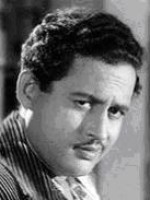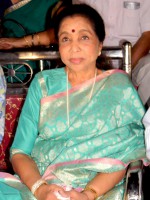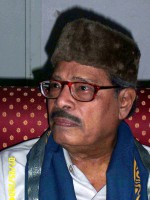Geeta Dutt est une Actrice et Playback Singer née le 23 novembre 1930

Geetā Dutt (born Geetā Ghosh Roy Chowdhuri) (23 November 1930 – 20 July 1972) was a prominent singer in India, born in Faridpur before the Partition of India. She found particular prominence as a playback singer in Hindi cinema. She also sang many modern Bengali songs.
Geeta and Guru Dutt had three children: Tarun (b. 1954), Arun (b. 1956), and Ninā (b. 1962). Tarun committed suicide in 1985. Arun Dutt died in 2014.
In 1957, Guru Dutt launched a movie, Gauri, with Geeta as its singing star. It was to be India's first movie in CinemaScope, but the project was shelved after only a few days of shooting. By then, their marriage was on the rocks: Guru Dutt had got romantically involved with Waheeda Rehman, and Geeta had taken to drinking. The break-up of their marriage affected Geeta's singing career.
Meanwhile, in distant Bengal, Geeta Dutt's songs were on every Bengali cine buffs lips as her dulcet voice crooned for Bengal's Queen of Hearts Suchitra Sen in some of biggest hits of the late 50s. "Tumi je amar" (Harano Sur, 1957) caught the fascination of the youth, portraying a romance that was passionate yet dignified. With music directors Hemant Mukherjee (better known as Hemant Kumar in Bombay film industry) (Harano Sur) and Nachiketa Ghosh (Prithibi Amare Chaaye, 1957 and Indrani, 1958), Geeta Dutt came up with songs that were hauntingly melodious, youthful and heartwarming. At a time when Sandhya Mukherjee's voice was synonymous with Suchitra Sen, Hemant Mukherjee and Nachiketa Ghosh picked Geeta Dutt.
In 1958, S.D. Burman had developed discord with Lata Mangeshkar as a playback singer, and he attempted to work with Geeta as the main singer of his compositions rather than the upcoming Asha Bhosle who, he felt, was relatively raw. However, out of her personal problems, Geeta would not practice her art sufficiently and failed to meet Burman's demanding standards. (He and O.P. Nayyar then started to work with Asha and helped her blossom as a singer.)
Guru Dutt's magnum opus Kaagaz Ke Phool came in 1959 in which Guru Dutt himself starred in the lead role with Waheeda Rehman. The film was in a way reflective of his own views on life and the transitory nature of fame and success in the film world.
Geeta Dutt came up with one of her best renditions in the heart-rending "Waqt ne kiya kya haseen sitam," composed by S. D. Burman and penned by Kaifi Azmi where she poured out her pain, anguish and pathos in every word. However, the box-office disaster of Kaagaz Ke Phool (which is now considered a classic) left them shattered, financially and emotionally.
In 1964, Guru Dutt died from a combination of alcohol and an overdose of sleeping pills. (His death was widely perceived as a suicide following two earlier attempts.) Geeta then suffered a serious nervous breakdown and ran into financial problems. She tried to resume her singing career, cutting discs at Durgā Pujā and giving stage shows. She performed in a leading role in a Bengali movie, Badhu Baran (1967), and sang admirably Anubhav (1971), which was her final performance to the music of Kanu Roy as she died of liver cirrhosis in 1972, at the age of 41.
Source : Wikidata
Geeta Dutt

Nom de naissance Geeta Ghosh Roy Chowdhury
Naissance 23 novembre 1930
Mort 20 juillet 1972 (à 41 ans)
Naissance 23 novembre 1930
Mort 20 juillet 1972 (à 41 ans)
Biographie
During Geeta's recording of songs for the movie Baazi, she met its young and upcoming director, Guru Dutt. Their romance culminated in marriage on 26 May 1953. Geeta went on to sing some of her best songs in his movies while continuing to sing in other assignments as well.Geeta and Guru Dutt had three children: Tarun (b. 1954), Arun (b. 1956), and Ninā (b. 1962). Tarun committed suicide in 1985. Arun Dutt died in 2014.
In 1957, Guru Dutt launched a movie, Gauri, with Geeta as its singing star. It was to be India's first movie in CinemaScope, but the project was shelved after only a few days of shooting. By then, their marriage was on the rocks: Guru Dutt had got romantically involved with Waheeda Rehman, and Geeta had taken to drinking. The break-up of their marriage affected Geeta's singing career.
Meanwhile, in distant Bengal, Geeta Dutt's songs were on every Bengali cine buffs lips as her dulcet voice crooned for Bengal's Queen of Hearts Suchitra Sen in some of biggest hits of the late 50s. "Tumi je amar" (Harano Sur, 1957) caught the fascination of the youth, portraying a romance that was passionate yet dignified. With music directors Hemant Mukherjee (better known as Hemant Kumar in Bombay film industry) (Harano Sur) and Nachiketa Ghosh (Prithibi Amare Chaaye, 1957 and Indrani, 1958), Geeta Dutt came up with songs that were hauntingly melodious, youthful and heartwarming. At a time when Sandhya Mukherjee's voice was synonymous with Suchitra Sen, Hemant Mukherjee and Nachiketa Ghosh picked Geeta Dutt.
In 1958, S.D. Burman had developed discord with Lata Mangeshkar as a playback singer, and he attempted to work with Geeta as the main singer of his compositions rather than the upcoming Asha Bhosle who, he felt, was relatively raw. However, out of her personal problems, Geeta would not practice her art sufficiently and failed to meet Burman's demanding standards. (He and O.P. Nayyar then started to work with Asha and helped her blossom as a singer.)
Guru Dutt's magnum opus Kaagaz Ke Phool came in 1959 in which Guru Dutt himself starred in the lead role with Waheeda Rehman. The film was in a way reflective of his own views on life and the transitory nature of fame and success in the film world.
Geeta Dutt came up with one of her best renditions in the heart-rending "Waqt ne kiya kya haseen sitam," composed by S. D. Burman and penned by Kaifi Azmi where she poured out her pain, anguish and pathos in every word. However, the box-office disaster of Kaagaz Ke Phool (which is now considered a classic) left them shattered, financially and emotionally.
In 1964, Guru Dutt died from a combination of alcohol and an overdose of sleeping pills. (His death was widely perceived as a suicide following two earlier attempts.) Geeta then suffered a serious nervous breakdown and ran into financial problems. She tried to resume her singing career, cutting discs at Durgā Pujā and giving stage shows. She performed in a leading role in a Bengali movie, Badhu Baran (1967), and sang admirably Anubhav (1971), which was her final performance to the music of Kanu Roy as she died of liver cirrhosis in 1972, at the age of 41.
Le plus souvent avec
Filmographie de Geeta Dutt (18 films)
Actrice

Malajahna (1965)
Réalisé par Nityananda Palit
Genres Drame
Acteurs Sarat Pujari, Geeta Dutt
Rôle Nishi
Note66%





Sati,the female protagonist of the movie,is forced into a marriage by her poor parents with a rich ugly old man living with a concubine. She finds the other way to overcome the mishap in her life when a young neighbor Nath develops love interest in her. Both finally leave the village and escape to Cuttack town. The conservative neighbors question their relationship. Sati, unable to bear the scandal concerning her and Natha, finally commits suicide by jumping into the river.
Son
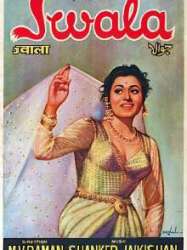
Jwala (1971)
Genres Action
Acteurs Sunil Dutt, Madhubala, Sohrab Merwanji Modi, Pran Krishan Sikand, Goga Kapoor, David Abraham
Rôle Playback Singer
Note45%






Anubhav (1971)
, 2h19Réalisé par Basu Bhattacharya
Genres Drame
Acteurs Sanjeev Kumar, Tanuja, Dinesh Thakur, A. K. Hangal
Rôle Playback Singer
Note74%





Meeta Sen (Tanuja) and Amar Sen (Sanjeev Kumar) have been married for several years. Due to Amar's hectic work schedule, the couple did not have children, as there was no time for intimacy. Meeta decides to take matters into her own hands, gets rid of the servants, save for Hari (A. K. Hangal), and decides to run the household on her own. This gets the couple to be closer, and eventually they do get intimate. And then Meeta's old flame Shashi Bhushan (Dinesh Thakur) not only re-enters Meeta's life, but also gets employed in the same organization as Amar, throwing their marriage again in jeopardy. One day while at home Amar and Shashi discuss their work and Amar tells that he'll join the office from tomorrow because he's fine now from his flu. While Shashi leaves, Amar sees him talking with his wife. The next day he asks Meeta to call for Shashi in an intimidating and arrogant tone, after Shashi leaves, Amar confronts Meeta and she explains their past relationship to him. Amar leaves the house without saying anything and asks Shashi to resign, though Shashi already has written his resignation letter because he sees himself as a reason of upheaval in their lives. Knowing this Amar says that' The past comes between us only when we aren't able to live the present completely'. After reaching home Amar tries to tell Meeta but she's circumlocuting in an amusing manner and says that she has understood and tells him that she has understood that he has understood. The movie ends with them embracing each other.
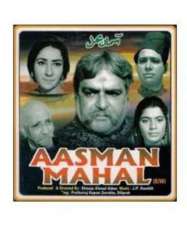
Aasman Mahal (1965)
, 2h52Réalisé par Khwaja Ahmad Abbas
Acteurs Nana Palsikar, David Abraham, Prithviraj Kapoor
Rôle Playback Singer
An elderly impoverished Nawab lives in his ancestral Haveli (Mansion). A business man wants to buy it, in order to convert it into a hotel. Though financially in a desperate state, the Nawab refuses to sell his property and clings on to his old-fashioned ideals of nobility. His son, however, is more in tune with the changing times and is in love with the daughter of the house help.

Grihasthi (1963)
, 1h34Réalisé par Kishore Sahu
Genres Drame
Acteurs Ashok Kumar, Manoj Kumar, Rajshree, Nirupa Roy, Mehmood Ali, Lalita Pawar
Rôle Playback Singer
Note66%





Harish Khanna (Ashok Kumar) lives in a happy household consisting of his wife Maya (Nirupa Roy) and his large family of seven daughters and one son. Also staying with them is his widowed sister (Lalita Pawar), and her son Jaggu (Mehmood). Harish spends four days of the week away from his family for work. Harish and Maya soon have a ninth child much to Maya's consternation, as her older daughter, Kamla (Bharati Malvankar) who is married to Gopal is also expecting a child. The fact that Kamla is pregnant is a cause of anxiety, as according to Gopal's parents, the couple have not been together since the wedding and her pregnancy is considered as a sign of her disreputable character. Gopal is not there to give an explanation and his parents decide to send Harish's older daughter back home. Harish finds out that two of his daughters, Kiran (Rajshree) and Kamini (Indrani Mukherjee) are in love with Mohan (Manoj Kumar), the son of the College principal, and Ravindra (Soodesh Kumar) respectively, and that Jaggu is in love with Rekha (Shobha Khote). Harish decides to get the three pairs married.

Son of India (1962)
Réalisé par Mehboob Khan
Genres Drame
Acteurs Simi Garewal, Sajid Khan, Kumkum, Sulochana, Tun tun (Uma Devi Khatri), Durga Khote
Rôle Playback Singer
Note54%





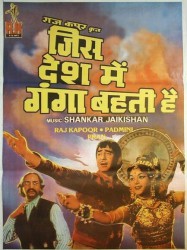
Jis Desh Men Ganga Behti Hai (1960)
, 2h47Genres Comédie, Musical
Acteurs Alyque Padamsee, Padmini Ramachandran, Aylin Prandi, Pran Krishan Sikand, Raj Kapoor, Lalita Pawar
Rôle Playback Singer
Note70%





Raju (Raj Kapoor) is a poor, friendly orphan who wins his bread by singing songs. One day he sees an injured man and helps him. Later he is kidnapped by few bandits who mistake him to be an undercover policeman. It then turns out that the injured man he helped is the leader (Sardar) of this gang. The Sardar takes good care of Raju and treats him with honour. Sardar's daughter Kammo (Padmini) falls in love with Raju. Kammo and Sardar convince Raju of how they are good bandits who are making sure that wealth is equally distributed amongst people.

Sitaron Se Aage (1958)
, 2h29Réalisé par Satyen Bose
Genres Drame, Musical
Thèmes Musique
Acteurs Ashok Kumar, Vyjayanthimala, Johnny Walker, Rajasulochana, Iftekhar, Manmohan Krishna Chadha
Rôle Playback Singer
Note59%





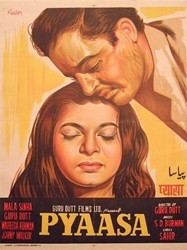
L'Assoiffé (1957)
, 2h26Réalisé par Guru Dutt
Origine Inde
Genres Drame, Musical, Romance
Thèmes La musique, Le suicide, Musique, Bollywood
Acteurs Guru Dutt, Mala Sinha, Waheeda Rehman, Johnny Walker, Rehman, Leela Mishra
Rôle Playback Singer
Note82%





Vijay (Guru Dutt), un poète, ne parvient pas à vivre de ses vers. On lui conseille d’écrire des poèmes d’amour, d’abandonner les réflexions pessimistes sur la nature humaine qui sont son thème de prédilection. Sa famille ne le soutient pas : ses frères vendent ses manuscrits à une usine de pâte à papier et le chassent de la maison. Vijay tente de racheter ses poèmes, mais le gérant de l’usine lui apprend qu’une femme en a fait l’acquisition. La nuit, alors que Vijay dort sur un banc public, il entend une femme, Gulabo (Waheeda Rehman) chanter un de ses textes. Il la suit, jusqu’à la maison close où elle officie. Lorsqu’elle s’aperçoit que Vijay est sans le sou, elle le chasse. En lisant un papier tombé de la poche du poète, elle réalise qu’il est l’auteur des poèmes qu’elle a achetés.

Ab Dilli Dur Nahin (1957)
Genres Drame
Acteurs Motilal, Sulochana, Yakub, Syed Ishtiaq Ahmed Jaffery, Amjad Khan, Nana Palsikar
Rôle Playback Singer
Note76%





Ab Dilli Dur Nahin is the story of a journey in search of justice. Hariram, a poor labourer, loved his wife and son Rattan so much that he lavished them with all the comforts of life even though it meant he was constantly in debt. Hariram's life fell apart when he lost his wife. So grief-stricken was he that he even lost his job due to poor attendance. Misery drove him to seek solace in alcohol. When drunken Hariram reached home he found his son crying as an evil loan shark Sethji had beaten him up.

Harano Sur (1957)
, 2h42Réalisé par Ajoy Kar
Genres Drame, Romance
Acteurs Suchitra Sen, Uttam Kumar, Utpal Dutt, Pahari Sanyal, Chandrabati Devi
Rôle Playback Singer
Note78%





An amnesiac after a train accident, Alok Mukherjee (Uttam Kumar) is rescued on escaping from the asylum where he is admitted by doctor Roma Banerjee (Suchitra Sen) who takes him to her father's (Pahadi Sanyal) country house in a village called Palaspur. There, while treating him she falls for him and he for her. They marry but a second accident makes him recall his life as a rich businessman in Calcutta and forget the memories spent with Roma. Roma follows him to Calcutta and meets him there but he doesn't recognise her. He hires her as governess to his niece instead. Roma keeps trying to simulate Alok's memory but is looked at suspiciously by Lata, Alok's fiancee in Calcutta who thinks Roma is snatching Alok away from her and who complains to Alok's mother. The latter has Roma kicked out. Alok realizing she is from Palaspur and that is where he got back his memory goes there and regains his memory of times spent with Roma there. All's well that end well.

Bade Sarkar (1957)
, 1h34Réalisé par Kishore Sahu
Genres Drame
Acteurs Kamini Kaushal, Durga Khote, Kishore Sahu, Agha, Gope, K. N. Singh (Krishan Niranjan Singh)
Rôle Playback Singer
An elderly lady Rashmi (Kamini Kaushal), starts telling her story to a newly married couple she's giving shelter to as their car has broken down. The story in flashback, is set twenty years earlier. The wealthy landowner, Zamindar Mansingh, is oppressive and demanding of the people in his state. Rashmi and her family have just arrived in Gangapur as guests of Mansingh. Rashmi is captured by the dreaded dacoit Black Bandit. The Bandit releases Rashmi but keeps her jewellery. She notices a mark on the bandit's hand, which is also present on Pratap's hand. Pratap is the oldest son of Mansingh, and Rashmi realises that he's the bandit. Pratap also suffers from a heart problem unknown to the others. It's soon revealed that Pratap is the bandit and his father asks him to leave the house. When Pratap has a heart attack, his father relents and hands over the running of the property to him. Rashmi stays by his side and they get married. The flashback ends with the couple asking about Pratap's fate. Pratap is shown opening the gate of the house, returning from a fishing trip, having managed to survive the doctor's prognosis given twenty years back.

Bhai Bhai (1956)
, 2h31Réalisé par Nityananda Palit
Genres Drame
Acteurs Beena Banerjee, Daisy Irani, Ashok Kumar, Kishore Kumar, Shyama, David Abraham
Rôle Playback Singer
Note65%





In a village there are two sections of people leaving nearby. The upper cast people belongs to Pradhan's and the lower caste belongs to Bauri's. Pradhan community are influential and landlords. The Bauri community are cultivation labourers, they work in the lands of Pradhan's. Bauris are treated as untouchable. Suduria is head of the village and is of upper cast. He is board minded and do not believe in untouchability. He has a soft corner for one Nidhi, who belongs to Bauri caste. Nidhi calls Suduria affectionately as brother. Bana, who is from Pradhan community does not accept the daring of lower community to maintain relationship with the upper caste. He calls a meeting in the village asks for punishment to Nidhi for maintaining relationship with upper caste. The village people decides to punish Nidhi for his crime and bars him from working in the land and taking water from pond. Though Suduria is against the decision, but remain silent against the voice of Pradhan community. The lower caste Bauri community feel harassed against the decision and decide not to work in the field of Pradhan community. Without labourers the cultivation work has get stopped and the land become barren. At last Pradhan community realize their fault and accept the relationship of Suduria and Nidhi.
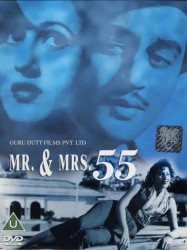
Mr. & Mrs. 55 (1955)
, 2h37Réalisé par Guru Dutt
Origine Inde
Genres Drame, Comédie, Musical, Romance
Thèmes La musique, Musique
Acteurs Guru Dutt, Madhubala, Lalita Pawar, Johnny Walker, Kumkum, Tun tun (Uma Devi Khatri)
Rôle Playback Singer
Note70%





Preetam (Guru Dutt), a struggling cartoonist, meets Anita (Madhubala) at a tennis match, where she is watching her favorite tennis star. Anita, a wealthy and westernized heiress is controlled by her feminist aunt, Sita Devi (Lalita Pawar). Sita is suspicious of men, and cultivates her attitudes in Anita. However, to receive her fortune, her father's will decrees that Anita must marry within one month of turning 21. Sita Devi doesn't agree with this, and tries to set Anita up with a sham marriage which will soon lead to divorce, thereby giving her both freedom and a fortune. Sita hires Preetam to marry Anita, but doesn't know that the pair have already met. Preetam is kept from Anita after their marriage, but he kidnaps her and takes her to the traditional house of his brother.

Kundan (1955)
, 2h1Réalisé par Sohrab Merwanji Modi
Genres Drame
Acteurs Sohrab Merwanji Modi, Nimmi, Sunil Dutt, Pran Krishan Sikand, Manorama, Kumkum
Rôle Playback Singer
Note66%





The film starts with Kundan (Sohrab Modi) stealing a loaf of bread from a kitchen and running home with it to feed his young niece Radha, and ailing mother. He is arrested and in court he says he had tried to find work, begged, and in the end was forced to steal. The judge sentences him to two years in prison. His niece visits him in jail telling him of his mother’s death. Kundan bends the iron rods and escapes but is caught. He is imprisoned for a further five years for trying to escape. The second time he tries to do so he gets an additional seven years. Kundan spends a total of fourteen years in prison doing hard labour. Radha (Nimmi) is married to Gopal (Pran) and they have a baby girl Uma. Gopal, who is in bad company and a crook gets her to part with all her jewellery and disappears with it. Radha and her baby find refuge with a tea-stall owner (Om Prakash) and his wife (Manorama)) who employ her to work for them for minimal wages. Kundan on release from jail sets out to find Radha. He has been told by the jail authorities including Inspector Sher Singh (Ulhas), a devout policeman, to keep them informed about his whereabouts and to present himself regularly at the police station. When he returns to his locality he is unable to find Radha and the neighbours drive him away, calling him a dacoit.
 Connexion
Connexion


